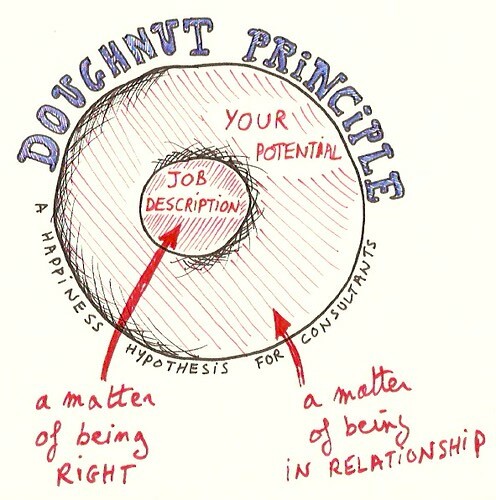The sensation of becoming excited about details and stuff the customer cares about. Happiness is the nudge that transforms a job into a calling. Whenever I pour my commitments as a consultant into the same bucket of commitments as the customer, there is no stopping me.
Some time ago I overheard a conversation between consultants who were talking about how difficult it was to make progress with their customer. One of them said: “The only difference between a consultant and a prostitute is that the prostitute sometimes says no.” At first that was funny; but the more I came to think of it, I realized that this statement is painfully close to the truth.
Everyday I see consultants showing up and running on automatic pilot. In fact, that is how I started my career as a consultant, before I decided to go the road less traveled. Now, on certain occasions I do say ‘no’ and I have to sit with the stigmatizing guilt for some time. But when I say ‘yes’ I mean it.
The Choice
For the short timeframe that I am on a project, I receive some authority, mostly by means of a function title, a vague task list, a sense of urgency and a set of deliverables. That’s pretty standard in my world. But from then on it is up to me to top this package with my individual commitment. The choice is clear:
- I can play safe, stick to the job description, produce impeccable deliverables, and push them into the lap of my customer. I am now in the position of being right and calling the customer ‘stupid’ when my advice is not followed.
- I can dive in and commit to their commitments. Attention here: boundaries become less obvious, influence happens without authority, and the true value of deliverables gets embedded in the relationship.
It’s the difference between being a spectator and being a player. Even though I am an outsider, in this very timeframe I tip over by committing to their commitments. All of a sudden time flies, passion is abundant, and devotion defaults into whatever I am working on.
It’s a relationship thing. Relationships matter. I start thinking: what if I would receive such an advice? How would I react? How does more empathy affect my advice? ‘Them’ becomes ‘us’. Their goals become my goals. I become a local. I am liberated from the attachment to being right. I am in relationship.
The Doughnut Principle
In his 1994 book The Empty Raincoat, Charles Handy introduces the doughnut principle.
Handy compares the work we do to a doughnut and says the core is what is essential. It is the agreed given of a job, or a project: the job description. And the outside of the core is our potential. The potential is variable and you can develop as much or as little of it as you want.
In my world, the outside is the relationship part. The point is that we are responsible for balancing our own doughnut: with a core (a duty) that matches our profession, and an outside that caters for our potential.
The Tragedy of Fitting in
Although the relationship part is less measurable, it is more valuable; both: to the customer and to myself. The tragedy for most consultants is that they are conditioned to comply to explicit measures that have nothing to do with fostering relationships.
Everybody wants to make progress, and from a compensation & benefits point of view, this is best done by complying to the measures. Most of us prefer to push the dimensions of the performance review to the max, that is: focus on the core and forget about the rest.
Who’s to Blame?
The truth is that we get into trouble when we try to measure ‘being in relationship’. The problem is that “getting suspicious of one’s own advice”, “connecting on an emotional level”, “committing without knowing how”, “creating art that matters” can’t measured on a scale from 1 to 10. Even though the values are beyond measures, the nature is subjective and non-linear. If Pavlov could not simulate it with a dog, you might as well forget about it.
Function descriptions, performance evaluations and well defined deliverables set the standard to good performance. Sadly enough, they also limit to our ability to develop the outside of the doughnut. When you are caught in the treadmill of performance evaluations, why on earth would you stand out and follow your heart – knowing that this may dilute the results on your evaluation? You don’t contribute beyond what is measurable. It’s not done.
The Happiness of Standing Out
There is a wonderful quote from Handy’s book that describes the feeling of disillusionment you get from focusing too much on the core of the doughnut:
We were not destined to be empty raincoats, nameless numbers on a payroll, role occupants, the raw material of economics or sociology, statistics in some government report
When reaching that point most consultants either cynically quit or numb themselves into automatic pilot.
However, for those who push through in search of more gratification in their work, they will find it in the outer part: the relationship part. Their gratification will make it easier to see the bigger picture of the contributions they are making. Eventually, their job might turn into a calling. The meaning of work then becomes connection, engagement and commitment.
Pushing is the Path
This is the strange part. It doesn’t just happen like that. In order to get there I have to leave the ‘position’ (i.e. fixed by definition) of a spectator, invisible to the players of the organization and blind to undercurrent; and get involved into the dynamics (i.e. in motion) of the insiders: I declare myself a player in the field.
It’s push, push, push. Like the character of the Muppet Show throwing himself under a taxi in order to catch a ride to the airport. There is no poetry in this move from outsider to insider: it’s a pure and blunt exercise of pushing yourself into the reality of the customer: language, habits, ways of thinking… you name it. You eat the same food and you laugh at the same jokes. You go local. You are local.
The Trust Strip
Pushing links me to the context of the customer to such an extent that I become ‘one of us’. I get connected. My work becomes connected. The leverage is in the relationship. I no longer need authority to have influence. Earlier in this series, Seth Godin called this emotional labor. Doing emotional labor is a blessing for a consultant: within the limited time slot of your assignment you are allowed to land on the landing strip of people’s trust-airport. You are allowed to contribute the best you’ve got.
This landing slot doesn’t come for free. You need to push through the depressing belly ache that precedes committing to their commitments. To go beyond the nausea that precedes letting go of being right. Pure anxiety. The only thing you want to do is run. Hang in there. The next thing you are likely to experience is something that matters: growing into a customer.




